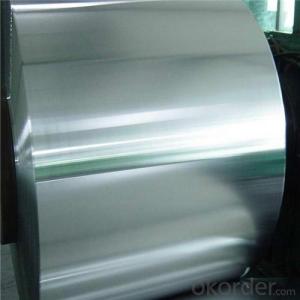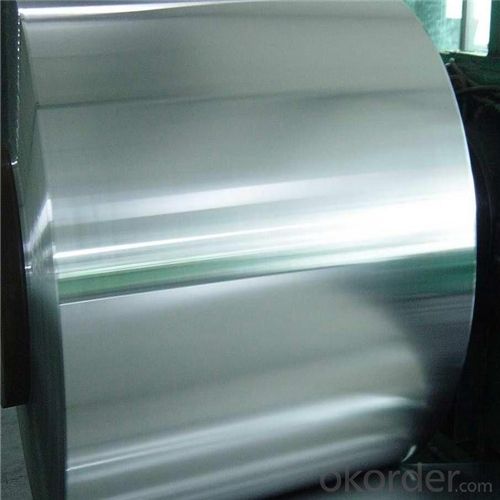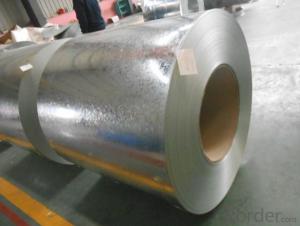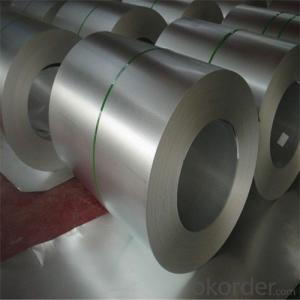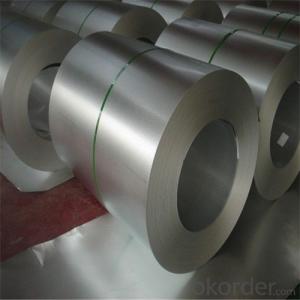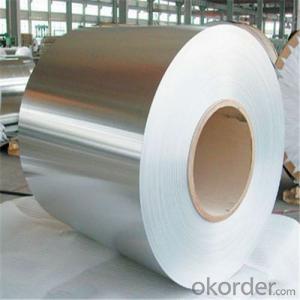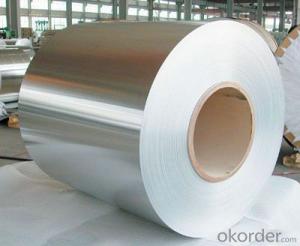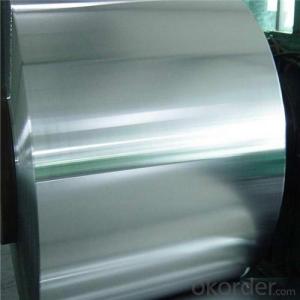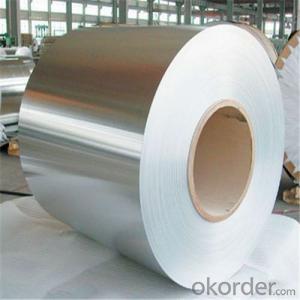Hot-Dip Aluzinc Steel Coil Used for Industry with Our Very High Quality
- Loading Port:
- Tianjin
- Payment Terms:
- TT OR LC
- Min Order Qty:
- 25 m.t.
- Supply Capability:
- 8000 m.t./month
OKorder Service Pledge
OKorder Financial Service
You Might Also Like
Hot-Dip Aluzinc Steel Coil Used for Industry
1.Structure of Hot-Dip Aluzinc Steel Coil Description
Hot-dip aluzinc steel sheet is substrated on cold rolled steel in various strength and specification. Coating composition is 55% aluminmum in weight ratio, 43.4% zinc, and 1.5% silicon, with excellent and heat resistance performance.
2.Main Features of the Hot-Dip Aluzinc Steel Coil
•High Purity
•Easy control and operation
•High strength
•Fast melting
•Competitive price
•Best Service
3. Hot-Dip Aluzinc Steel Coil Images
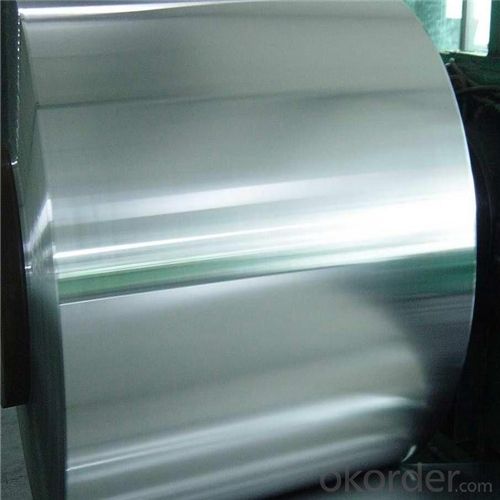
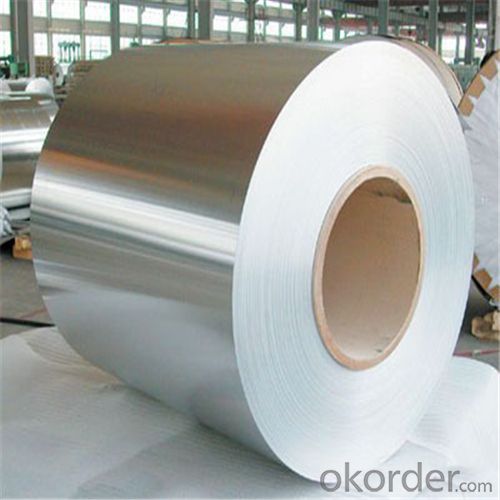
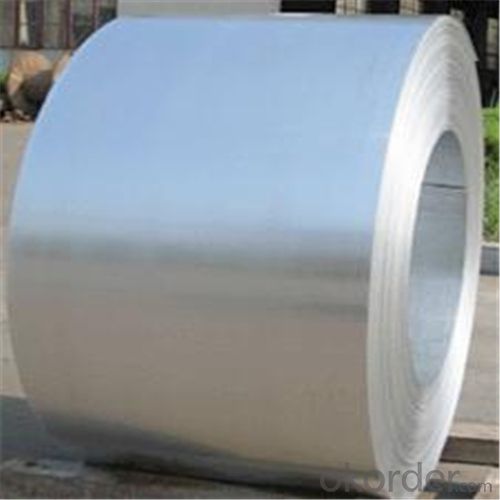
4. Hot-Dip Aluzinc Steel Coil Specification
Hot-Dip Aluzinc Steel Coil | |
Thicknenss | 0.16mm-3.5mm |
Width | 1250mm max |
Coating mass | 30-185g/㎡ |
Spangle | Regular/Minimized/Zero Spangle |
Coil inner diameter | 508-610mm |
Surface treatment | Chromated/non chromated, Oiled/non oiled, Anti finger print |
5.FAQ of Hot-Dip Aluzinc Steel Coil
We have organized several common questions for our clients,may help you sincerely:
①How about your company?
A world class manufacturer & supplier of castings forging in carbon steel and alloy steel,is one of the large-scale professional investment casting production bases in China,consisting of both casting foundry forging and machining factory.
②How to guarantee the quality of the products?
We have established the international advanced quality management system,every link from raw material to final product we have strict quality test;We resolutely put an end to unqualified products flowing into the market. At the same time, we will provide necessary follow-up service assurance.
③How long can we receive the product after purchase?
In the purchase of product within three working days, We will arrange the factory delivery as soon as possible. The pecific time of receiving is related to the state and position of customers.Commonly 7 to 10 working days can be served.
Sincerely welcome to contact us for the future details if any item interest you ,and we will make every effort to assure that your requirements will be satisfied ,and we hope to establish long-term business relations with you on the basis of the equality and mutual benefit.
- Q: I am thinking about getting a cold steel tilite or a kershaw leek or possibly a buck sirus. If you have had any experience with these knives please give it to me. thanks
- Cold Steel while not made in the U.S. are still good knifes. I EDC a 2 Mini Tanto as my third knife for over 16 years. Recently the scales fell off and were lost, they are no longer available. My #2 EDC for the last 11 years has been a Kershaw Chive and it is still on my belt behind my Blackberry. I move between 2 EDC primary knives a 1996 Benchmade/Emerson CQC-7 and a Emerson Model I folder. I have gotten great service from all of them, and I rate them as follows: 1) Emerson 2) Cold Steel or Benchmade (Blue or Black Box product) 3) Benchmade (Red Box - made outside of US) or Kershaw All of the 2nd and 3rd tetieruys have non US products, not neccessarily bad. I have had good results all of them. Value for the dollar = Benchmade Blue Box. Decent value for entry price Kershaw is good as a first knife. Hope this helps.
- Q: How are steel coils used in the production of packaging machinery?
- Steel coils are used in the production of packaging machinery to create various components such as frames, supports, and structural parts. These coils are shaped, cut, and formed into specific designs to provide strength, durability, and stability to the machinery. Additionally, steel coils can be used to fabricate conveyor belts, rollers, and other moving parts, ensuring smooth operation and efficient packaging processes.
- Q: How do steel coils contribute to the HVACR equipment industry?
- Steel coils play a crucial role in the HVACR (Heating, Ventilation, Air Conditioning, and Refrigeration) equipment industry by providing efficient heat transfer and ensuring the effective functioning of various HVACR systems. These coils are typically made of high-quality steel and are an integral component of equipment such as air conditioners, heat pumps, refrigerators, and boilers. One of the primary functions of steel coils in HVACR equipment is to facilitate heat transfer. These coils are designed to efficiently transfer heat between the refrigerant and the surrounding air or water, depending on the specific system. By utilizing steel coils with a large surface area and good thermal conductivity, HVACR equipment can effectively cool or heat a given space. This ensures optimal energy efficiency and reduces operating costs for both residential and commercial applications. In addition to heat transfer, steel coils also contribute to the overall durability and longevity of HVACR equipment. The steel used in these coils is typically corrosion-resistant, which helps prevent damage from moisture or other environmental factors. This reliability is essential in HVACR systems, as they are often subjected to harsh conditions and must operate continuously to maintain comfortable indoor environments. Moreover, steel coils are versatile and can be customized to meet the specific requirements of different HVACR applications. Manufacturers can vary the size, shape, and configuration of the coils to fit the available space and optimize performance. This flexibility allows for the efficient integration of steel coils into various HVACR equipment, ensuring they meet the specific heating and cooling needs of different environments. Overall, steel coils are indispensable in the HVACR equipment industry. They enable efficient heat transfer, enhance durability, and offer customization options, thereby ensuring the effective functioning and energy efficiency of HVACR systems. By incorporating high-quality steel coils into their products, manufacturers can provide reliable and long-lasting solutions for heating, ventilation, air conditioning, and refrigeration needs in both residential and commercial settings.
- Q: What are the dimensions of steel coils used in the agricultural machinery industry?
- The specific application and requirements play a significant role in determining the dimensions of steel coils utilized in the agricultural machinery industry. Generally, the dimensions of steel coils in this industry fall between 0.5 and 2.0 millimeters in thickness and 600 to 1500 millimeters in width. These dimensions are commonly utilized for agricultural machinery components like panels, frames, brackets, and reinforcements. It is worth mentioning that these dimensions can be tailored to meet the specific needs of the machinery or the manufacturer's specifications.
- Q: What is the difference between cold rolled strip and cold rolled steel coil?
- Cold rolled steel strip: the width is below 900mm! Cold rolled steel coil: the width is above 1000mm! Materials and purposes are not very different, basically the same!
- Q: I'm going to buy a guitar for beginners and i wondered what strings are better steel or nylon?
- Yeah, you have some really bad answers here. You don't buy a nylon string guitar because you are a beginner, you buy one because you want to play classical music. You also cannot move between nylon and steel strings on the same guitar. Unless you want to play classical finger style music you need a steel string guitar. Just have extra light strings put on it and you can most likely have the action lowered a bit also, both of which will make it easier on the fingers. But the bottom line is this, if you want to play guitar you will have to go through a stage where you fingers get a little tender. Just keep your practice sessions short in the beginning, like 15 - 20 minutes at a time until the calluses build up.
- Q: What are the advantages of using steel coils?
- There are several advantages of using steel coils. Firstly, steel coils are highly durable and have a longer lifespan compared to other materials, making them ideal for long-term use. Additionally, steel coils have excellent strength-to-weight ratio, allowing them to withstand heavy loads without compromising structural integrity. They also provide superior resistance to corrosion, making them suitable for various environments, including high humidity or coastal areas. Furthermore, steel coils can be easily recycled, making them an environmentally friendly choice. Overall, the advantages of using steel coils include durability, strength, corrosion resistance, and sustainability.
- Q: How do steel coil manufacturers manage inventory?
- Steel coil manufacturers manage inventory by implementing various strategies and techniques. Firstly, they maintain a robust forecasting system to accurately predict demand and plan production accordingly. This helps in avoiding overproduction or stockouts. Additionally, they establish strong relationships with suppliers to ensure a steady supply of raw materials and reduce lead times. Inventory is carefully monitored using inventory management software, which tracks stock levels, identifies slow-moving or obsolete inventory, and enables timely reordering. Just-in-time (JIT) or lean manufacturing techniques are often employed to minimize inventory holding costs. Lastly, regular inventory audits and analysis are conducted to identify areas for improvement and optimize inventory levels for maximum efficiency and profitability.
- Q: How do steel coils contribute to the construction machinery industry?
- Steel coils are essential components in the construction machinery industry as they are used for manufacturing various equipment such as cranes, excavators, bulldozers, and loaders. These coils serve as raw materials for fabricating structural parts, chassis, frames, and hydraulic systems, providing the necessary strength, durability, and stability required for heavy-duty construction machinery. Additionally, steel coils are used in the production of attachments like buckets, blades, and booms, enhancing the functionality and versatility of construction equipment. Overall, steel coils play a crucial role in advancing the construction machinery industry by ensuring the robustness and performance of the equipment.
- Q: My mother is in a weilding class, and today she accidentally welded Galvanized Steel. She doesn't feel good and she wants to know what the symptoms are for Galvanized Poisoning from breathing in the Fumes. Please help, I am worried for her.
- Galvanized steel is nothing more than regular steel with zinc added. However, unless you wear the proper gear or ventilate the fumes away, the zinc can cause heavy metal poisoning. As someone who has suffered from it before, usually the symptoms are an upset stomach, feeling queasy, diarrhea, and sometimes hallucinations. If it is bad, you start getting joint pain, a metallic taste in your mouth, and develop a fever. Usually, you can treat mild zinc poisoning by drinking lots of fluids and flushing out your system as much as possible. Still, if the problems persist for more than an hour or so, it can be lethal with many blacksmiths having died as a result of it. If she still feels bad, call a poison control center and tell them she breathed in zinc fumes. They will probably tell you to go to the ER to start treatment. It is not something you wait out.
Send your message to us
Hot-Dip Aluzinc Steel Coil Used for Industry with Our Very High Quality
- Loading Port:
- Tianjin
- Payment Terms:
- TT OR LC
- Min Order Qty:
- 25 m.t.
- Supply Capability:
- 8000 m.t./month
OKorder Service Pledge
OKorder Financial Service
Similar products
Hot products
Hot Searches
Related keywords
